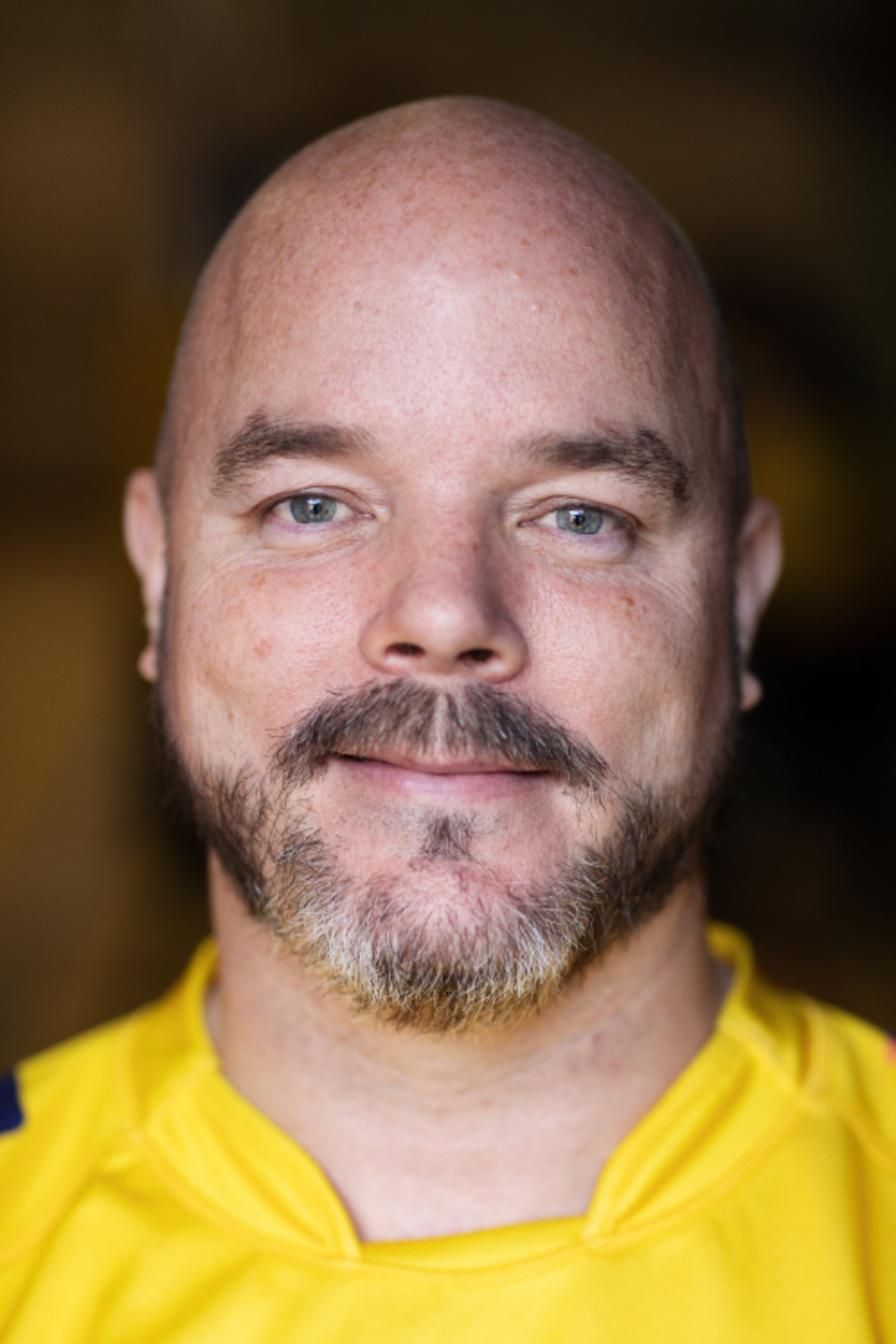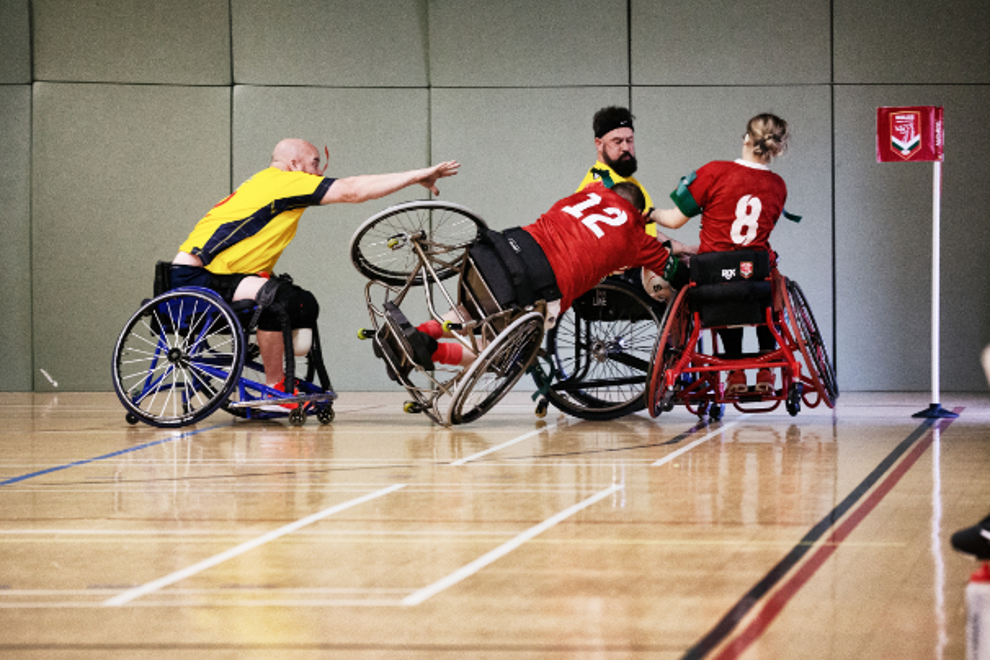The crunching sound of metal on metal fills the sports centre as wheelchairs smash headlong into each other. The repetitive collisions test the strength of the frames to the limit and send shockwaves through the players’ bones, muscles and tendons. And this is just the warm-up! Welcome to wheelchair rugby league; a sport played at heavy metal thunder levels in which an irresistible flow of action rages across an indoor sports arena, punctuated by feints, swerves and misdirection as well as a conveyor belt of crashes, smashes and tumbles from wheelchairs.
It’s World Cup year for the sport, both on field and wheelchair-based, and the home nations are gearing up for a tilt at the crown which will be fought out in Sheffield, London and Manchester in November. “It can be a bit daunting when you first see the sport as there are lots of collisions, but there’s a huge amount of skill and tactics involved that make it a compelling sport to watch and play,” says Blesma Member and Scotland captain Michael Mellon.
Today, his team are vying for honours in the Celtic Cup, a key warm-up tournament against Ireland and Wales. Held at the Plas Madoc Leisure Centre near Wrexham, the matches are frenetic, and the percussion of jarring metal and shouts from the players and fans make a deafening chorus. But what makes wheelchair rugby league much more than merely a demolition derby are its rules. Possession changes after six tackles, which are made by ripping Velcro tags from a player’s shoulder after blocking their way. This creates end-to-end action with wheelchairs being up-ended or crashing on their side as players swerve, lunge and reach for an advantage.
Tries are scored by grounding the ball, often with a spectacular dive that sends both wheelchair and player airborne, with conversions performed by hitting the ball with the hand through goal posts that are one third the size of standard posts. The five-a-side games are played with a size rugby ball (one size smaller than the professional sport) over two 40-minute halves, with 10 substitutions allowed. The sport is inclusive; it is open to any player with a registered disability, with teams allowed to field two players without disabilities.


RAF, RUGBY AND REHAB
Michael, who served in the RAF, represented his station at both rugby union and rugby league before an injury in a match led to his left leg being amputated in 2013. He represented Great Britain at wheelchair rugby and basketball before taking up rugby league and becoming Scotland’s captain.
“It’s an exciting, high-energy sport and it’s great to be involved in the Scotland setup,” says Michael, 41, who is married with three children. “Since I joined Blesma, I’ve been able to try loads of sports, and that has been fantastic for me as I was at home and putting on weight after the amputation, and was struggling with the psychological impact as I had always been so active.
“Getting back to sport gave me a fresh start. We train hard and push ourselves, and we have developed a professional set-up with great managers and coaches. We don’t have the playing depth of some countries, but we are committed and are determined to have a go at the World Cup.”
Before the first match in the Celtic Cup the Scottish team, complete with a strength and conditioning coach, physios and a performance analyst, hold a squad session to run through set plays, discuss opposition strengths and weaknesses, and award Scotland jerseys to new caps before Michael leads them out to face Ireland with an inspiring team talk.
From the very first whistle the pace is blistering, and the noise almost deafening. Tags fly in the air – the player has to replace them from a supply after each tackle – wheelchairs clatter and instructions echo around the sports hall. In the chaos, the players perform rapier-like darts through fast-closing gaps to off-load the ball before they are buffeted and bashed off course.
Ireland take an early lead in the opening match, but tries from John Willans – whose right leg was crushed in a motorbike accident – and Connor Blackmore keep it tight, with Michael in the thick of the action. The lead changes hands several times before Ireland eventually claim the win 38-35 in a pulsating advertisement for the sport.
Wales, ranked number three in the world, prove too strong for both their rivals in the round-robin competition, and hold on to the title in convincing style, with Stuart Williams becoming the first player to score 50 tries in Wales rugby league colours after his six-try haul in the tournament.
Ireland claim second spot with former Grenadier Guardsman Toby Burton-Carter starring as vice-captain. “It’s a breathtaking sport. I have PTSD and a degenerative disc disease in my spine,” says Toby after the action. “I used to be on medication that was turning me into someone I, my family and friends couldn’t recognise. I started a wellness programme and then got into sport, which gives me a physical and adrenaline boost. My weight has gone down from 21 stone to 16 stone, and it has done wonders for my mental health.
“It gives me a fantastic outlet; I play with a number of people I served with, and it gives me the chance to meet other ex-Forces personnel, and it is great to have this level of competition.”
Toby, 44, from Warrington, who has also had success as a wheelchair basketball player, adds: “I was invited to go along and give wheelchair rugby league a go just after lockdown. I remember getting bounced all over the place in my first game but loved it and took to it quickly.”
Michael, who lives in Fife and plays for Dundee Dragons, is very keen for more Blesma Members to get involved in the sport. “It is a great sport for those of us who are ex-military as it offers a genuine element of competition, the ability to work hard as a team and a real feeling of camaraderie. I would definitely recommend it to any Blesma Member.” Michael is currently developing a project that will aim to run taster sessions for new players, including Blesma Members. For more information about Scotland wheelchair rugby league, and the sport in general, visit www.scotlandrl.com
The World Cup will run from 03-19 November, with group games being played at the Copper Box Arena in London and EIS Sheffield. The final will take place at Manchester Central. France will head into the tournament ranked world number one, with England in second seed, Wales in third, Scotland sitting in fifth and Ireland in sixth. England and Ireland will meet each other in Group A alongside Spain and Australia, while Scotland and Wales are in Group B with France and the USA. The tournament opens with a double header at the Copper Box Arena with Spain facing Ireland at 5pm followed by England against Australia at 7.30pm, while Scotland and Wales are in action the next day at EIS Sheffield against USA and France, respectively. The Wheelchair Rugby League World Cup will be televised live on the BBC

We can help
We are dedicated to assisting serving and ex-Service men and women who have suffered life-changing limb loss or the use of a limb, an eye or sight. We support these men and women in their communities throughout the UK. Click the link below to find out the different kinds of support we offer.
Get Support
Leave a comment
Join fellow Members and supporters to exchange information, advice and tips. Before commenting please read our terms of use for commenting on articles.